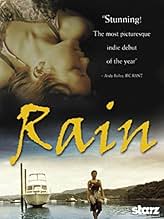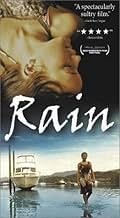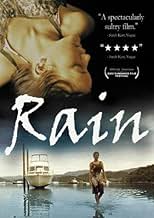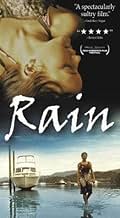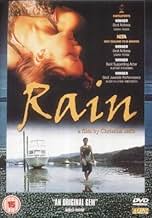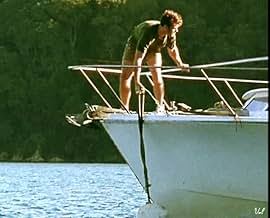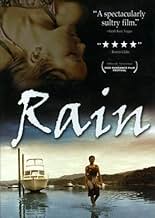VALUTAZIONE IMDb
6,9/10
1660
LA TUA VALUTAZIONE
Aggiungi una trama nella tua linguaWhilst on a family vacation on the Mahurangi Peninsula in New Zealand, 13-year-old Janey begins to realize that her parents' marriage is on the rocks.Whilst on a family vacation on the Mahurangi Peninsula in New Zealand, 13-year-old Janey begins to realize that her parents' marriage is on the rocks.Whilst on a family vacation on the Mahurangi Peninsula in New Zealand, 13-year-old Janey begins to realize that her parents' marriage is on the rocks.
- Regia
- Sceneggiatura
- Star
- Premi
- 5 vittorie e 6 candidature totali
Recensioni in evidenza
A family of four vacations at their beach house in 1970's New Zealand. The parents are Kate (played by Sarah Peirse) and Ed (Alistair Browning), while the children are Janey (Alicia Fulford-Wierzbicki, about 13 years old) and Jim (Aaron Murphy, about 8). This sounds rather idyllic, but it is almost immediately obvious that Kate and Ed's marriage is on shaky ground. While the children get along better than most siblings and the parents do seem to care for their children, the adults in the film all drink large quantities of alcohol to numb themselves. The one other significant character is a photographer named Cady (Marton Csokas) who lives on his boat and reminded me a bit of fellow New Zealand actor Russell Crowe. I won't give away much of the plot, because there isn't much there to give away. This is not a criticism -- if anything, it is a compliment to the writers for avoiding unnecessary complications.
The main character is Janey, who is in transition from girl to woman. The young first time actress is extremely good and quite believable with this complex material. The boy who plays her brother is also very natural. The adults didn't impress me as much, but then again they were supposed to appear emotionally shut down, and they succeeded admirably. That much of the film's feeling is conveyed without words is a tribute to both the actors and to the direction (by first time director Christine Jeffs). The cinematography didn't seem to me to draw attention to itself, except one shot looking backwards through a hand pushed lawn mower.
The New Zealand accents were a bit difficult to understand at times. Without subtitles or the ability to back up and listen again, I did miss a few lines. Home video will likely make this aspect easier, but since much of the film is set outdoors, some of the atmosphere would be lost on the small screen.
I am surprised that none of the reviews I have seen compared this film to "The Ice Storm." Both films are set in the 1970's with parents who are emotionally distant and children (child in this case) who are becoming adults. While Ang Lee's film is definitely better in my view, that there is a comparison at all speaks highly for this effort. "Rain" is worth seeing, though probably not going out of your way for.
Seen on 6/3/2002.
The main character is Janey, who is in transition from girl to woman. The young first time actress is extremely good and quite believable with this complex material. The boy who plays her brother is also very natural. The adults didn't impress me as much, but then again they were supposed to appear emotionally shut down, and they succeeded admirably. That much of the film's feeling is conveyed without words is a tribute to both the actors and to the direction (by first time director Christine Jeffs). The cinematography didn't seem to me to draw attention to itself, except one shot looking backwards through a hand pushed lawn mower.
The New Zealand accents were a bit difficult to understand at times. Without subtitles or the ability to back up and listen again, I did miss a few lines. Home video will likely make this aspect easier, but since much of the film is set outdoors, some of the atmosphere would be lost on the small screen.
I am surprised that none of the reviews I have seen compared this film to "The Ice Storm." Both films are set in the 1970's with parents who are emotionally distant and children (child in this case) who are becoming adults. While Ang Lee's film is definitely better in my view, that there is a comparison at all speaks highly for this effort. "Rain" is worth seeing, though probably not going out of your way for.
Seen on 6/3/2002.
My friend and I spent the after-movie coffee trying to decide whether Rain was indeed the best New Zealand movie we have seen. An intense, evocative slice of 1970s beach holiday life, there is nothing about it that doesn't work.
This project clearly couldn't have worked or even happened if it weren't for the amazing discovery of the star, the very young Alicia Fulford-Wierzbicki. She makes Rain an uncomfortably accurate portrayal of what it's like to be inside an adolescent girl's body and life. Her character, Janey, is twelve-going-on-twenty, experimenting with the power that can come from being a young woman, full of new secrets. Her performance is intense in a deliciously natural way and carries the entire film.
While her character is central, this is not just another coming-of-age story. We also see the complex interactions of her family members and various holiday acquaintances and watch tested loyalties, experiments in love and attraction, and quite a bit of swimming and fishing.
The cinematography is distinctive and excellent, all the other actors are faultless and the soundtrack, by Kiwi icon Neil Finn, is exactly right. Rain is a frighteningly impressive debut by director, Christine Jeffs.
This project clearly couldn't have worked or even happened if it weren't for the amazing discovery of the star, the very young Alicia Fulford-Wierzbicki. She makes Rain an uncomfortably accurate portrayal of what it's like to be inside an adolescent girl's body and life. Her character, Janey, is twelve-going-on-twenty, experimenting with the power that can come from being a young woman, full of new secrets. Her performance is intense in a deliciously natural way and carries the entire film.
While her character is central, this is not just another coming-of-age story. We also see the complex interactions of her family members and various holiday acquaintances and watch tested loyalties, experiments in love and attraction, and quite a bit of swimming and fishing.
The cinematography is distinctive and excellent, all the other actors are faultless and the soundtrack, by Kiwi icon Neil Finn, is exactly right. Rain is a frighteningly impressive debut by director, Christine Jeffs.
Rain is the type of New Zealand movie that New Zealanders love. Slice of Kiwiana presented with high art mixed with bleakness.
People have berated the double barreled ending as contrived but it is also symbolic. Janey comes of age through one event and is hit home that she can't go back through the other.
The acting is great. And the cinematography almost steals the show.
Kiwi batch life is presented in full force. A young girl's all too fast growing up because of the parents selfishness is presented with only a hint of sentimentality and emotional manipulation.
People have berated the double barreled ending as contrived but it is also symbolic. Janey comes of age through one event and is hit home that she can't go back through the other.
The acting is great. And the cinematography almost steals the show.
Kiwi batch life is presented in full force. A young girl's all too fast growing up because of the parents selfishness is presented with only a hint of sentimentality and emotional manipulation.
It does not actually rain in this movie, but there is a sullen, overcast feel to it. Usually family holidays are recalled with some affection the bad bits edited out. In this family's story from the 1970s there's not much that is pleasant to recall. Mum is drinking herself to oblivion and having an affair with a neighbour, Dad is not coping either, and the 13 year old daughter is confused and frightened by the goings on. Her little brother, a sunny kid, is not so affected. Early on, it is plain that some kind of tragedy is going to happen.
Apart from some of the flattened vowels, and the unremarkable coastline just north of Auckland this is a story that could be set anywhere amongst the aimless middle classes of western society the people who have what they need or more, but who have no higher ambition but to joylessly consume. In the wife's case this is unfortunately alcohol. Her daughter has reached puberty but has to cope on her own. (the local boys seem to be behind her in development anyway).
As the daughter, Alicia Fulford-Wierbicki puts in a fine performance, as does Sarah Pierce as the mother. The men are all pretty shapeless with Marton Csokas doing a glowering Russell Crowe number as the mother's lover.
It's a bleak story but well done.
Apart from some of the flattened vowels, and the unremarkable coastline just north of Auckland this is a story that could be set anywhere amongst the aimless middle classes of western society the people who have what they need or more, but who have no higher ambition but to joylessly consume. In the wife's case this is unfortunately alcohol. Her daughter has reached puberty but has to cope on her own. (the local boys seem to be behind her in development anyway).
As the daughter, Alicia Fulford-Wierbicki puts in a fine performance, as does Sarah Pierce as the mother. The men are all pretty shapeless with Marton Csokas doing a glowering Russell Crowe number as the mother's lover.
It's a bleak story but well done.
This film was delicious to watch. Some of the cinematography was really striking, as were some of the cinematographic choices, such as the sparing use of very brief black-and-white shots. I also liked the depictions of children at play (one moment in particular: when Jim cavorts in the dimly lit front yard at dusk in semi-slow-mo in a dracula cape, in a sort of scene-change-sideshow-distraction, innocently echoing the ominous tone of the previous scene). The play really rang true, reminding me of my own interactions with my siblings. The relationship between the two children was endearing and a welcome relief from the other very draining relationships in the movie.
I spent most of the film wondering whether a particular event was going to happen, and I felt that the few moments after it did happen near the end were the best of the film, UP UNTIL something else happened that I felt was a little over the top. The former event brought together the relationships that Janey, the young protagonist, had with all of the other characters in such rich, complex, achingly painful ways, it really left me in awe. It was a very strange experience, then, to have the second, over the top event happen not a minute later. I really felt this last event was unnecessary, and it cut me off from fully appreciating the best moment of the film.
So, the first 94 minutes or so were really great, and the last three, while they did cut me off from my greatest moment of admiration, did not detract from the overall greatness of the film.
I spent most of the film wondering whether a particular event was going to happen, and I felt that the few moments after it did happen near the end were the best of the film, UP UNTIL something else happened that I felt was a little over the top. The former event brought together the relationships that Janey, the young protagonist, had with all of the other characters in such rich, complex, achingly painful ways, it really left me in awe. It was a very strange experience, then, to have the second, over the top event happen not a minute later. I really felt this last event was unnecessary, and it cut me off from fully appreciating the best moment of the film.
So, the first 94 minutes or so were really great, and the last three, while they did cut me off from my greatest moment of admiration, did not detract from the overall greatness of the film.
Lo sapevi?
- QuizOf the picture's source 'Rain' (1994) novel, the film's director Christine Jeffs said: ''I really loved the sense of atmosphere and foreboding in the novel and also the reflection on childhood...The sense of transience in that relationships come and go and that the moment is precious''. The challenge for Jeffs was to recreate those elements in the medium of film. She added: ''I spent a long time trying to persuade other people that there was a film in there. A story about the detail of everyday life, that was worth translating to the screen.''
- BlooperAlthough this film is set in the year 1972, the partygoers at Ed and Kate's party are dancing to the Sherbert song "Howzat", which was not released until 1976.
- ConnessioniFeatured in Rain: Promo Reel (2003)
- Colonne sonoreBath/You Don't Know
Written by Neil Finn (as N. Finn)
Mushroom Music (Australia & New Zealand)
Roundhead Music administered by Wixen Music Publishing (USA & Canada)
EMI Music Publishing UK (rest of the world)
I più visti
Accedi per valutare e creare un elenco di titoli salvati per ottenere consigli personalizzati
- How long is Rain?Powered by Alexa
Dettagli
- Data di uscita
- Paese di origine
- Siti ufficiali
- Lingua
- Celebre anche come
- Дождь
- Luoghi delle riprese
- Rodney District, Auckland Region, Nuova Zelanda(location: Mahurangi Peninsula)
- Aziende produttrici
- Vedi altri crediti dell’azienda su IMDbPro
Botteghino
- Lordo Stati Uniti e Canada
- 455.164 USD
- Fine settimana di apertura Stati Uniti e Canada
- 15.222 USD
- 28 apr 2002
- Lordo in tutto il mondo
- 492.661 USD
- Tempo di esecuzione1 ora 32 minuti
- Colore
- Mix di suoni
- Proporzioni
- 1.66 : 1
Contribuisci a questa pagina
Suggerisci una modifica o aggiungi i contenuti mancanti








